Product Introduction: Sige1
Let's get to know Sige1 in 5 minutes.
Overview
The ArmSoM-Sige1 utilizes the Rockchip RK3528, a new-generation intelligent set-top box and multimedia application chip. It is applicable to IPTV/OTT boxes, cloud terminals, and integrated products. It is a high-performance, low-power 4K player with decoding capability supporting up to 8K. Additionally, it also supports the AVS2 and HDR VIVID standards.
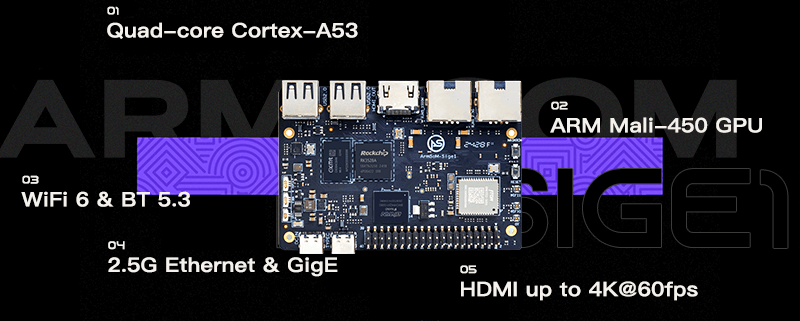
Key Parameter
- SoC: Rockchip RK3528
- CPU: RK3528 Quad-core Cortex-A53 up to 2.0GHz
- GPU: ARM Mali-450 GPU
- VPU/Decoding:
- Hardware Decoding: Supports 60fps playback of 4K ultra-high-definition video with up to 10-bit pixels. Supports video standards including H.265, H.264, AVS2, etc.
- Hardware Encoding: Supports 60fps capture of 1080p high-definition video. Supports H.265 and H.264 encoding.
- RAM: 1GB / 2GB / 4GB 32-bit LPDDR4x, default 2GB
- Flash: 0GB / 8GB / 16GB / 32GB / 64GB eMMC, default eMMC 8GB
- WIFI/BT: Onboard IEEE 802.11a/b/g/n/ac/ax WIFI6 and BT5.3 syn43752
- Operating Voltage: Wide range input voltage, from 4.5V to 18V (voltage error ±5%)
- Operating Temperature: 0°C to 80°C
- Operating System:
- Officially Supported by Rockchip: Android 9.0_box, Debian11, Buildroot
- Third-party Support: Armbian
- PCB: 6-layer PCB board design
- Weight: 38.9g
- Dimensions: 92mm × 62mm x 14.6mm
Getting started
Sige User Manual
How to start using your Sige
Hardware
Hardware Interface

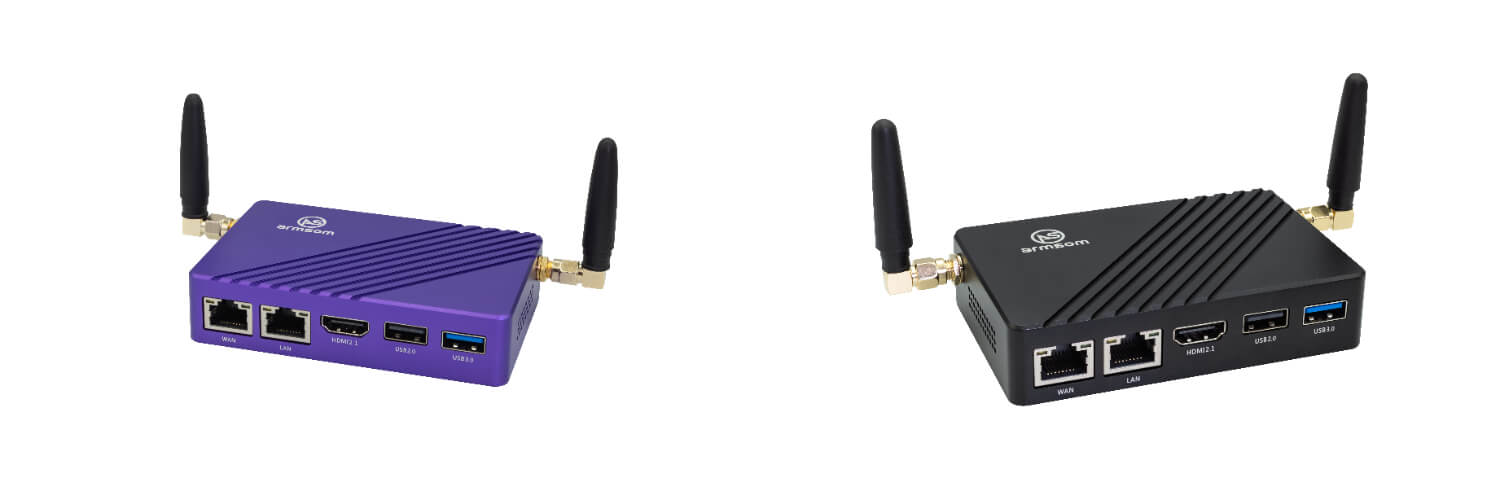
On the Sige1, there are two Type-C interfaces that look identical, but only one of them (Type-C DC IN) serves as the power input interface.
Hardware Spec
Sige1 Hardware Spec
| Category | Functional Parameters |
|---|---|
| SOC | |
| CPU | |
| GPU | |
| VPU/Codec | |
| RAM | |
| Flash | |
| Network | |
| Video Output | |
| Audio | |
| USB Ports | |
| 40-PIN | |
| Others | |
| Power | |
| Buttons | |
| System | |
| Dimensions | |
| Operating Temperature |
Comparison of Specifications for Sige7/5/3/1
| Sige7 | Sige5 | Sige3 | Sige1 | |
|---|---|---|---|---|
| SoC Process | 8nm | 8nm | 22nm | 28nm |
| CPU | Rockchip RK3588 Cortex-A76 x4 @2.4GHz and Cortex-A55 x4 @1.8GHz | Rockchip RK3576 Cortex-A72 x4 @2.2GHz and Cortex-A53 x4 @1.8GHz | Rockchip RK3568B2 Cortex-A55 x4 @2GHz | Rockchip RK3528 Cortex-A53 x4 @2GHz |
| GPU | ARM Mali-G610 MP4 | ARM Mali G52 MC3 GPU | Arm Mali‑G52‑2EE | ARM Mali-450 GPU |
| NPU | 6TOPS@INT8(3 NPU core) | 6TOPS@INT8(2 NPU core) | 1TOP@INT8 | - |
| RAM | 4GB/8GB/16GB/32GB 64-bit LPDDR4x | 4/8/16GB 32-bit LPDDR4x | 2/4GB 32-bit LPDDR4x | 2/4GB 32-bit LPDDR4x |
| eMMC | 64GB/128GB eMMC | 32/128GB eMMC | 32GB eMMC | 8 eMMC |
| TF Card | Molex Slot, Spec Version 2.x/3.x/4.x(SDSC/SDHC/SDXC) | Yes | Yes | Yes |
| Output | 1x HDMI 2.1, supports 8K@60fps 1x MIPI DSI up to 4K@60fps 1x DP 1.4 up to 8K@30fps | 1x HDMI 2.1, supports 4K@120fps 1x MIPI DSI, up to 2K@60fps 1x DP1.4, up to 4K@120fps | 1x MIPI DSI up to 2K@60fps 1x HDMI OUT2.0, supports 4K@60fps | 1x HDMI OUT2.0b, supports 4K@60fps |
| Decoder | 8K@60fps H.265/VP9/AVS2 8K@30fps H.264 AVC/MVC 4K@60fps AV1 1080P@60fps MPEG-2/-1/VC-1/VP8 | H.264, H.265, VP9, AV1 and AVS2 etc. up to 8K@30fps or4K@120fps | 4KP60 H.265/H.264/VP9 | H.265, H.264, AVS2 4K@60fps |
| Encoder | 8K@30fps H.265 / H.264 | H.264 and H.265 up to 4K@60fps | 1080P60 H.264/H.265 | H.264 and H.265 up to1080@60fps |
| Wi-Fi | AP6275P Wi-Fi 6 Module 802.11a/b/g/n/ac/ax, 2T2R MIMO with RSDB | SYN43752 Wi-Fi 6 Module 802.11a/b/g/n/ac/ax, 2T2R MIMO with RSDB | SYN43752 Wi-Fi 6 Module 802.11a/b/g/n/ac/ax, 2T2R MIMO with RSDBs | SYN43752 Wi-Fi 6 Module 802.11a/b/g/n/ac/ax, 2T2R MIMO with RSDBs |
| PCIE | PCIe 3.0 4-lanes M.2 Key M 2280 NVMe SSD Supported | PCIe 2.1 1-lanes M.2 Key M 2280 NVMe SSD Supported | PCIe 3.0 2-lanes M.2 Key M 2280 NVMe SSD Supported | - |
| Ethernet | 2x 2.5G Ethernet | 2x Gigabit Ethernet | Gigabit Ethernet & 2.5G Ethernet | Gigabit Ethernet & 2.5G Ethernet |
| USB Host | 1x USB 3.0 & 1x USB 2.0 | 1x USB 3.0 & 1x USB 2.0 | 1x USB 3.0 & 1x USB 2.0 | 2x USB 2.0 |
| USB-C | 1x USB-C Power jack & 1x USB Type-C 3.0(DP1.4/OTG) | 1x USB-C Power jack & 1x USB Type-C 3.0(DP1.4/OTG) | 1x USB-C Power jack & 1x USB3.0 OTG | 1x USB-C Power jack & 1x USB2.0 OTG |
| MIPI CSI/DSI | 2x 4-lane MIPI CSI 1x 4-lane MIPI DSI | 2x 4-lane MIPI CSI 1x 4-lane MIPI DSI | 1x 4-lane MIPI CSI 1x 4-lane MIPI DSI | - |
| 40-PIN Header | yes | yes | yes | yes |
| LEDs | 2x LEDs | 2x LEDs | 2x LEDs | 2x LEDs |
| Board Dimensions | 92mm × 62mm x 14.6mm | 92mm × 62mm x 14.6mm | 92mm × 62mm x 14.6mm | 92mm × 62mm x 14.6mm |
RK3528 Block Diagram
RK3528 Block Diagram
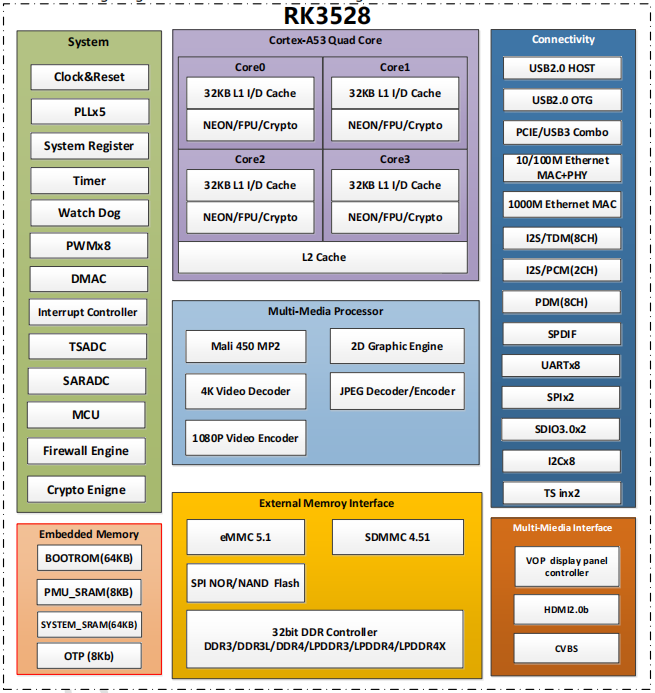
Hardware Pin Definitions
40-PIN header
| GPIO Number | Function | Pin | Pin | Function | GPIO Number |
|---|---|---|---|---|---|
| +3.3V | 1 | 2 | +5.0V | ||
| 130 | I2C1_SDA_M0 / UART3_RTSN / I2S1_SDI3 / GPIO4_A2_d / | 3 | 4 | +5.0V | |
| 131 | I2C1_SCL_M0 / UART3_CTSN / I2S1_SDI2 / GPIO4_A3_d | 5 | 6 | GND | |
| 1 | REF_CLK_OUT_M0 /GPIO0_A1 | 7 | 8 | UART0_TX_M0 / JTAG_MCU_TCK_M1 / JTAG_CPU_TCK_M1 / GPIO4_D0_d | 152 |
| GND | 9 | 10 | UART0_RX_M0 / JTAG_MCU_TMS_M1 / JTAG_CPU_TMS_M1 / GPIO4_C7_u | 151 | |
| 0 | GPIO0_A0 | 11 | 12 | I2S1_SCLK / UART1_RTSN / GPIO4_A5_d | 133 |
13 | 14 | GND | |||
15 | 16 | ||||
| +3.3V | 17 | 18 | |||
| 138 | SPI0_MOSI / PDM_SDI0 / I2S1_SDO3 / GPIO4_B2_d | 19 | 20 | GND | |
| 139 | SPI0_MISO / PDM_SDI2 / I2S1_SDI1 / GPIO4_B3_d | 21 | 22 | ||
| 140 | SPI0_CLK / I2S1_SDI0 / GPIO4_B4_d | 23 | 24 | SPI0_CSN0 / PWR_CTRL1 / GPIO4_B6_u | 142 |
| GND | 25 | 26 | PWM6_M0 / SPI0_CSN1 / PDM_SDI3 / GPIO4_C1_d | 145 | |
| 147 | I2C0_SDA_M0 / PWM0_M0 / GPU_AVS / GPIO4_C3_d | 27 | 28 | ARM_AVS / PWM1_M0 / I2C0_SCL_M0 / GPIO4_C4_d | 148 |
29 | 30 | GND | |||
31 | 32 | GPIO4_C0/PWM5_M0 / FEPHY_LED_LINK_M0 / UART3_TX_M1 | 144 | ||
| 143 | GPIO4_B7 / PWM4_M0 / FEPHY_LED_SPD_M0 / UART3_RX_M1 | 33 | 34 | GND | |
| 134 | UART1_TX_M0 / I2S1_LRCK / GPIO4_A6_d | 35 | 36 | ||
37 | 38 | GPIO3_B2 / SPI0_CLK / I2S1_SDI0 | 106 | ||
| GND | 39 | 40 | GPIO4_A7_d / UART1_RX_M0 / I2S1_SDO0 | 135 |
FAN
0.8mm connector(CON3102)
| Pin | Assignment | Description |
|---|---|---|
| 1 | VCC_5V0 | 5V Power ouput |
| 2 | GND | GND |
| 3 | PWM | PWM control |
HPOUT
0.8mm connector(CON3101)
| Pin | Assignment | Description |
|---|---|---|
| 1 | AOR | right channel |
| 2 | AOL | left channel |
| 3 | GND | GND |
VRTC
0.8mm connector(CON2200)
| Pin | Assignment | Description |
|---|---|---|
| 1 | + | Positive pole |
| 2 | - | Negative pole |
Resources
Source Code
Armbian
Armbian Linux build framework
Sige1 kernel
Improved Rockchip Linux
Sige1 uboot
rockchip-linux/u-boot
Official Image
ArmSoM team uses Debian bullseye as the official operating system.How to Flash Image📤
Download
The following systems have been tested and verified by ArmSoM official:
Network disk address:
Google Drive link| logo | Description | Download |
|---|---|---|
 | debian11 for Sige1 : Debian 11 continues to uphold Debian's tradition by offering a stable and reliable operating system environment. It has undergone rigorous testing and stability assurances, making it suitable for servers, desktops, and embedded devices alike. | Google Drive link |
 | Android9 Box for Sige1 : The Android 9 Box version is an Android operating system specifically designed for TV boxes. It is based on Android 9 Pie, focusing on optimizing user experience and performance for large-screen devices. | Google Drive link |
Third Party System
| logo | Description | Download |
|---|---|---|
 | Armbian for Sige1 : Armbian is a computing build framework that allows users to create ready-to-use images with working kernels in variable user space configurations for various single board computers. It provides various pre-build images for some supported boards. These are usually Debian or Ubuntu flavored. | armbian image |
| ubuntu-rockchip for Sige1 : This project aims to provide a default Ubuntu experience for Rockchip RK3588 devices. Get started today with an Ubuntu Server or Desktop image for a familiar environment. | ubuntu-rockchip image | |
| lede | lede for Sige1 : lede is a highly modular and automated embedded Linux system with powerful network components and scalability. | Google Drive link |
Hardware Resources
Product Certificates
Supply Statement
The ArmSoM-Sige1 will be produced at least until August 2034.
Accessories
The official accessories designed for the ArmSoM-Sige are intended to help you achieve optimal performance from your computer.
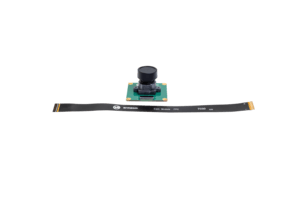
Camera Module 1
The camera module 1, compatible with the OV13850 sensor, is a low-power camera module.

Display-10-HD
A 10.1-inch touchscreen display, ideal for interactive projects like entertainment systems and information dashboards.
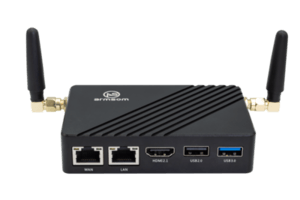
Sige DIY Case 1
Combining high-quality construction with a clean, minimalist design, the metal casing adds a premium touch.
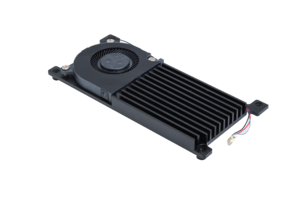
Active Cooling Kit
The active cooling kit ensures Sige runs smoothly even during the most demanding tasks.
Purchase Samples
ArmSoM Official Website: https://www.armsom.org/product-page/Sige1
ArmSoM Official AliExpress Store: https://aliexpress.com/item/3256807356692995.html
ArmSoM Official Taobao Store: https://item.taobao.com/item.htm?id=824590173298
For OEM & ODM, please contact: sales@armsom.org
Notes
- Before handling the device, please ensure you wear an anti-static wrist strap or take electrostatic discharge measures to prevent damage to the development board.
- Assembly should be performed in an electrostatic-safe environment, avoiding operations in dry and low-humidity conditions.
- When not in use, store the device in an anti-static bag and keep it in a suitably temperature-controlled, low-humidity environment to prevent static electricity buildup.
- When handling the device, avoid friction or collisions to prevent the generation of static electricity that could cause damage.
- When holding the device, try to avoid direct contact with the chips on the mainboard to prevent static damage.
- Do not plug or unplug wires or other devices while the device is operating to avoid damage from electrical surges.
- When connecting or disconnecting the GPIO/MIPI expansion interfaces, make sure to turn off the power and disconnect the power cable to prevent damage from electrical current.
Without effective cooling measures, the surface temperature of the main chip may exceed 60 degrees. When handling the device, please avoid direct contact with the SoC and surrounding power inductors to prevent burns. Ensure that the environment is well-ventilated during operation to prevent localized heat buildup, which could lead to overheating. Additionally, do not place the device in direct sunlight. It is recommended to choose between the official cooling fan, heat sink, or third-party cooling kits based on specific usage conditions to ensure optimal cooling performance.